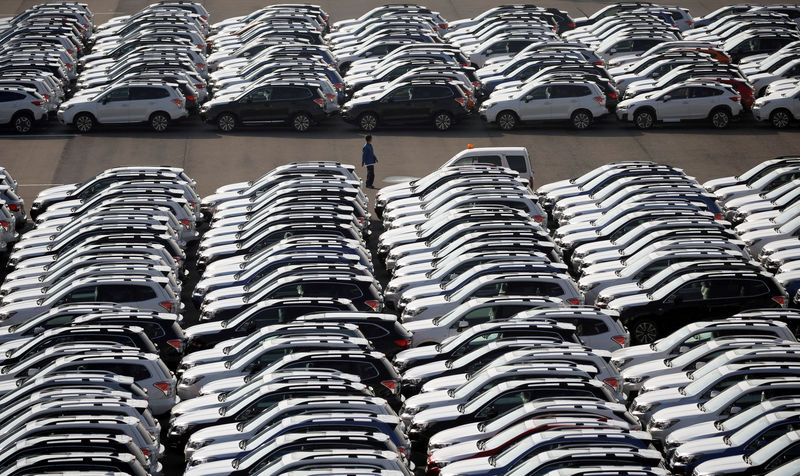By Stanley White and Leika Kihara
TOKYO (Reuters) - Japan's economy grew more than expected in the second quarter, helped by strong household and business spending and recovering from an earlier contraction, but global trade tensions loom as major risks to the export and investment outlook.
The rebound in consumer spending is a welcome development for the Bank of Japan but unlikely to be enough to change its stance that interest rates need to stay low for a very long time to end the country's deflationary mindset.
While analysts expect the economy to sustain a recovery, some expect escalating global trade disputes will hurt the export and manufacturing sector, major drivers of growth in the world's third largest economy.
"Things are going well, but given questions around trade friction between the United States and China, there is a lot of uncertainty whether things will continue to go well," Finance Minister Taro Aso said.
Japan's economy expanded 1.9 percent on an annualized basis in April-June, beating a median market forecast for a 1.4 percent increase, government data showed on Friday.
That followed a revised 0.9 percent contraction, larger than initial estimates, in the previous quarter, which put an end to the best run of growth since the 1980s bubble economy.
Compared with the previous quarter, gross domestic product (GDP) rose 0.5 percent, more than the median estimate for a 0.3 percent increase and following a 0.2 percent contraction in January-March.
In a sign the economic recovery was broadening, domestic demand was the main driver of growth.
Private consumption, which accounts for about 60 percent of the economy, was the biggest contributor, rising 0.7 percent on brisk demand for cars and home appliances, the data showed.
The gain was more than the median estimate for a 0.2 percent increase and marked a rebound from a revised 0.2 percent fall in the first quarter, it showed.
"For the third and fourth quarters, we've penciled in similar growth to the second quarter, but the risks are a bit to the downside," said Marcel Thieliant, senior Japan economist at Capital Economics.
"The economy is running into capacity constraints. We are quite certain there will be some sort of tariffs on Japanese cars. It's a question of how much."
Many industries face labor shortages due to a rapidly ageing population. This helps push up wages but has also caused capacity constraints because some companies are shortening operating hours due to a lack of workers.
Japan certainly needs higher consumer spending to push up inflation, but with consumer prices taking so long to rise, economists have pushed back the timeframe in which they expect the BOJ to unwind monetary easing until 2020 or later, a Reuters poll on Thursday showed.
Capital expenditure rose 1.3 percent, exceeding market forecasts for a 0.6 percent increase and marking the biggest gain since October-December 2016.
The external environment, however, was less favorable, even without any direct impact to exports from increasing trade hostilities between the United States and its major trading partners over the quarter.
External demand, or exports minus imports, subtracted 0.1 percentage point from growth, missing expectations for a 0.1 percentage point contribution.
"If the trade conflict heightens uncertainty over the outlook, companies could rein in spending, even if Washington does not impose higher tariffs on Japanese goods," Yusuke Ichikawa, senior economist at Mizuho Research Institute, said.
U.S. President Donald Trump is pushing Tokyo to sign a bilateral free-trade agreement and has threatened to impose higher tariffs on auto imports including those from Japan.
The two countries failed to reach any consensus in talks on Thursday between U.S. Trade Representative Robert Lighthizer and Japanese Economy Minister Toshimitsu Motegi, who stuck to Tokyo's position that it preferred multilateral free-trade agreements over bilateral ones.
Trump is trying to re-negotiate the U.S. trade relationship with other countries to curb practices that he says are unfair to American companies and workers.
This has led to an increase in tensions between the United States and China as the world's two largest economies slap retaliatory tariffs on each other.
Japan has repeatedly said it prefers multilateral trade negotiations, which puts it at loggerheads with the United States.
